- Home
- Sherry Thomas
Murder on Cold Street Page 2
Murder on Cold Street Read online
Page 2
The tremor in her voice indicated more than trepidation for her husband. There was a fear that she might further incriminate him.
Lord Ingram had to remind himself that at Stern Hollow, not long ago, things had looked dire, too, with all circumstantial evidence pointing at him and him alone. Still, he was troubled.
“Let’s begin with known facts,” said Holmes calmly. “And then, Mrs. Treadles, everything else you care to share.”
It occurred to him that although he’d been in this space before, this was the first time he had ever sat in on a client meeting, if one didn’t count his first visit with Inspector Treadles, which took place before “Sherlock Holmes” had officially taken up the mantle of the world’s only consulting detective.
“Known facts,” echoed Mrs. Treadles. “In that case I suppose I should begin with the arrival of Sergeant MacDonald at my house this morning, asking to speak to me.”
There probably wasn’t anyone with whom Inspector Treadles worked more closely than Sergeant MacDonald, his colleague and apprentice who had accompanied him on many a case.
“When did Sergeant MacDonald show up at your residence?”
“A quarter before ten or thereabouts.”
Lord Ingram glanced at the grandfather clock softly ticking away in a corner of the parlor. Twenty past one.
“Are you usually home at that time, Mrs. Treadles?” asked Holmes softly. “I understand you took over the running of Cousins Manufacturing at the end of summer.”
A look of embarrassment crossed Mrs. Treadles’s face. “Typically I would have been at the office by then. But it was a late evening the night before, and I was not feeling entirely well this morning. So I had risen only shortly before.”
Holmes signaled for her to continue.
Mrs. Treadles took a more measured sip of her whisky. “I was surprised and more than a little alarmed when I heard the sergeant announced. I knew of him, very well, since my husband enjoyed speaking of his work and Sergeant MacDonald figured prominently in that work. But we’d met only one time before, when the inspector and I ran into him when we were out and invited him to join us for a meal at a nearby establishment.”
She did not elucidate why there was so little socializing between Inspector Treadles and his trusted lieutenant outside of Scotland Yard, but Lord Ingram knew. Mrs. Treadles had not been born into the same social stratum as himself and Holmes, but her late father’s wealth, however new and sooty, meant that her station in life was far above that of the man she married—and therefore also far above that of the vast, vast majority of his colleagues.
He’d been to the Treadles residence, a wedding gift from her father. It was not large or showy, but sat at an excellent address and was beautifully furnished within—an acquisition that would have been beyond the means of any mere policeman, unless he were the commissioner himself.
And even then, to afford the house, he would probably have needed to economize in other areas of his life.
Little wonder then that Sergeant MacDonald had not been invited for Sunday dinners or other occasions.
“Sergeant MacDonald looked grave—and shaken—when he was shown in. My heart began to pound. I asked him if the inspector was all right. He assured me that he was well, and then said, ‘But unfortunately he has been arrested for murder.’”
She shivered. Lord Ingram rose, went to the grate, and added coal to the fire.
“I stared at Sergeant MacDonald. I was sure he was spouting gibberish. And yet, after some time, I heard myself ask, ‘For whose murder?’
“‘That of one Mr. John Longstead,’ he said.
“I became truly disoriented. ‘Mr. Longstead—my father’s old friend Mr. Longstead?’ I cried.
“‘I wouldn’t know about that,’ answered Sergeant MacDonald uncertainly. ‘But I understand he did work for Cousins Manufacturing.’”
Mrs. Treadles pinched the space between her brows, her eyes half closed. Lord Ingram felt his own temples throb at the implication of her words.
“That man did far more than work for Cousins,” Mrs. Treadles murmured, as if to herself. “My father supplied the funds and was deft at managing the business, but it was always Mr. Longstead’s engineering acumen that gave us a competitive advantage.
“For twenty-five years they were friends, colleagues, and partners. Mr. Longstead’s health led to his departure—his physician warned that he could no longer work at the sort of feverish pace he sustained. And he only returned to Cousins as a personal favor to me, after I took up the running of the enterprise.”
A sharper focus came into Mrs. Treadles’s eyes as she looked from Holmes to Lord Ingram and back again. “But I saw him last night, alive and well in his own house, only hours before Sergeant MacDonald knocked on my door. And as far as I knew, Inspector Treadles wasn’t even in London—he was away for work.
“So there I was, staring at Sergeant MacDonald, my mind a jumble. Who would murder dear old Mr. Longstead? And why would my husband, who had sworn to uphold law and order, be remotely connected to Mr. Longstead’s death, let alone generate so much suspicion—and evidence—that he was already arrested?
“‘But the inspector barely knows Mr. Longstead!’ I heard myself exclaim.”
Silence.
Mrs. Treadles lowered her face, as if she preferred to address the next part of her account to the tea table. “You probably guessed, Miss Holmes, by the fact that Sergeant MacDonald showed up at my house, rather than my office, at that particular hour, that he didn’t know about my recently acquired responsibilities at Cousins.
“You see, Inspector Treadles was at first not particularly . . . enthusiastic that I’d ventured outside of the domestic sphere. After he returned from the investigation at Stern Hollow, he began to express an interest at last. So I invited Mr. Longstead and his niece to dinner at my house. They then reciprocated the invitation at their house. On both occasions, Inspector Treadles was cordial and respectful to Mr. Longstead, exactly as one ought to conduct oneself before a much-revered family friend.
“The second dinner was more than two weeks ago. Afterward, he expressed an admiration for Mr. Longstead and thought it fortunate I had him as an ally. As far as I know, they never met again. And now to hear him named as a responsible party for Mr. Longstead’s death?
“I poured out my shock and incredulity to Sergeant MacDonald. He was sympathetic, as he himself was no less shocked and firmly believed that Scotland Yard must have made a mistake.”
“Did he see the inspector in person today?” asked Holmes, her tone reflecting none of Mrs. Treadles’s confusion and turmoil.
“No. He said he asked to but wasn’t allowed. And he was warned to keep what he’d been told strictly to himself, except for informing me. He did have a note from the inspector. I’ve brought it, but I’m afraid it isn’t much more informative.”
She took out a piece of paper from her reticule and handed it to Holmes. Holmes scanned it. Then, after a look at Mrs. Treadles for permission, passed it to Lord Ingram.
My dearest Alice,
I’m sorry that Sergeant MacDonald will be the bearer of bad news. I’m sorry that I will cause you much worry and uncertainty. And I’m sorry that it will most likely get worse before it gets better.
I will need to rely, as always, on your strength and resilience.
Difficult days lie ahead, but I remain,
Your most
devoted husband,
Robert
P.S. I love you with all my soul, even if I do not always, or indeed often, deserve you.
Two
Mrs. Treadles gazed at her husband’s note for a while, after Lord Ingram returned it to her. “It’s true that he doesn’t proclaim his innocence in this note, but since he does seem to believe that it will get better . . .”
“Then we should take his professional opinion into account,” said Holmes.
Her client caressed the edge of the note. “After Sergeant MacDonald left, I went around to Scotland Yard. Since I knew that the arrest wasn’t yet common knowledge, I pretended to be, of all things, an admirer of Sherlock Holmes’s and asked if I could meet with Inspector Treadles to learn more about the great consulting detective. There I was told that he wasn’t expected at the Yard today.”
“So Scotland Yard doesn’t want it known that one of its own has been arrested?” murmured Lord Ingram.
“Scotland Yard had a major embarrassment recently, my lord, when they arrested you in triumph and had to later release you with full apologies,” said Holmes. “It’s understandable that they wish to keep the matter hushed for now—or for as long as they can keep it hushed. That does not, of course, help us. The first person I—the first person my brother would wish for me to speak to would be Inspector Treadles himself.”
“What will you do then?” asked Mrs. Treadles, her fingers now clutched tightly together in her lap, around a white handkerchief.
“We will try a different course of inquiry,” said Holmes calmly. “My lord, I can hear the newspaper boy’s progress on Upper Baker Street. Will you be so kind as to fetch a copy for us?”
He did and was back in the parlor in two minutes flat, still scanning the paper, an early-afternoon edition printed around noon, shortly after the daily meteorological forecasts had been received and typeset. “No accounts of sensational murders or arrested Scotland Yard inspectors. I also don’t see any mention of Mr. Longstead, Cousins Manufacturing, or indeed anything to do with Inspector Treadles’s current difficulties.”
He looked up. “But one minute, Mrs. Treadles. What is Mr. Longstead’s address in town?”
br /> “31 Cold Street.”
At the answer, something flickered across Holmes’s face. An almost unnoticeable change, and yet for her, this counted as genuine surprise.
His fingertips tingled. “The house next door got a mention. ‘A disturbance erupted at 33 Cold Street in the early hours of the morning. The police were called for. The house was apparently unoccupied and the nature of the disturbance has not yet been disclosed. It is not known whether the events of the night had anything to do with the nuisance of fireworks in the district previously reported in these pages.’”
“What was the nature of the gathering at Mr. Longstead’s house?” inquired Holmes.
Mrs. Treadles twisted her handkerchief between her fingers. “It was a dinner, followed by a dance. A coming-out soiree for Miss Longstead, his niece.”
The London Season ran from late spring to high summer; it had no definitive beginning but ended absolutely before the first day of grouse shooting. Granted, the season was for the Upper Ten Thousand, but Lord Ingram was under the impression that the merely wealthy emulated their “betters” and set their social calendar to similar dates. Besides, the weather in May, June, and July was simply more conducive to merrymaking.
A coming-out soiree, in town, in December—he wouldn’t go so far as to say it wasn’t done, but it wasn’t done often.
Mrs. Treadles echoed his thoughts. “A bit of a strange time to be having a debutante party. I would have organized a New Year’s ball, instead of a dance a few days before Christmas. Mr. Longstead was introducing his niece not to scions of the landed gentry, for whom leisure is a mark of gentlemanliness, but to families similar to his own, the fathers and sons of which were both needed at their businesses the next day to see to the closing of the year.”
“How long did the gathering last?” asked Holmes.
“That I don’t know. I felt a headache coming on after midnight and by one o’clock I was in my carriage, driving away. At the time I wouldn’t have been surprised if the dancing went on until dawn—Miss Longstead looked splendid and the guests were enthusiastic. But as I reached home, a fog was rolling in. So it’s possible—perhaps even likely—that the party dispersed not too long after my departure.”
“Were you aware of anything unusual going on either at Mr. Longstead’s gathering or in the house next door?”
Mrs. Treadles dropped her eyes to her handkerchief and shook her head. “No.”
“And of course you never saw Inspector Treadles at any point that night?”
“No.”
Lord Ingram glanced at Holmes. He did not have her observational powers. But he didn’t need observational powers of such magnitude to doubt Mrs. Treadles’s last two answers.
It was far more difficult to tell when Holmes lied, because nothing else about her changed as she shifted from truth to fiction, not tone, not posture, not eye movements or facial flickers. Part of it, he was sure, was because of her copious mental capacity, which easily accommodated the calculations and calibrations required for lying that strained the ordinary mind.
Another part, and he wondered how large this part might be, was attributable to the fact that she was impervious to the dictates of moral absolutes. Like most everyone else, she must have been told again and again that lying was bad. Unlike with most everyone else, it had left little impression on her and she viewed telling the truth as a situational, rather than an ethical, choice.
Mrs. Treadles, on the other hand, lacked both Holmes’s talent for fibbing and her moral fluidity, and was clearly uncomfortable with her most recent declarative answers.
“I’d mentioned that I thought my husband was out of town, not expected for some more time,” she went on. “In hindsight, he must have returned to London at some point during the night, if not sooner. Perhaps he entered the house neighboring Mr. Longstead’s—I have no way of knowing. I can’t tell you anything about his movements—or the rationales for them.”
People who lie often say too much. With Mrs. Treadles’s additional explanation, Lord Ingram grew more convinced that she could tell them something important on both accounts, if she chose to.
Or was forced to.
Holmes took a sip of her tea and did not say anything.
Silence fell.
Over the years, Lord Ingram had experienced a great deal of silence in Holmes’s presence. In fact, he was certain that if a tally were made, their acquaintance would turn out to consist of more silence than speech.
This was, however, the first time he’d ever known her to wield silence as an interrogation technique, an intentionally unsubtle signal that she found the witness less than creditable.
Mrs. Treadles shifted in her chair. She picked up her hitherto untouched tea and drank. And drank. And drank.
“That the murder hasn’t been reported by the papers is a blessing, I’m sure,” said Lord Ingram, breaking the silence. “But at the moment we need more information.”
Mrs. Treadles’s teacup shook visibly. “Please let me know what else I can tell you.”
Holmes was still silent, but her silence was not pointed or reproachful. He’d left most of the questioning to her—it was her investigation, after all—but she’d have known that he would not let Mrs. Treadles squirm in discomfort for too long. She’d issued a warning, that was all.
“Did Mr. Longstead go in to work every day?” she asked. “Would his absence have been already remarked upon?”
“No, he didn’t come into work every day,” said Mrs. Treadles, setting down her teacup. “It was understood from the beginning that he would serve only in an advisory capacity. I would see him on a Thursday, then perhaps not until the Tuesday of the following week. He made sure to be present when I met with the managers as a group, for which I was immensely grateful, as they became less dismissive of me out of respect for him.”
She laughed a little, mirthlessly.
Lord Ingram felt a surge of self-reproach. Great upheavals had taken place in his life around the time Mrs. Treadles inherited Cousins Manufacturing. Still, he could have spared her more thoughts, perhaps even a letter or two, asking after how she fared in her new capacity as the owner of a complex going concern.
He’d been pleased for her, as he’d thought that the running of a large enterprise, while demanding, would suit her well, given her energy and intelligence. And that after an initial period of adjustment, she would wrap her hands firmly around the reins of the company.
But the undertone of bleakness in that not-quite-laugh—of outright despair, even—made it clear that the initial period of adjustment had been far rockier than he’d supposed, that she still did not have control of Cousins, and that she had just lost her greatest ally.
Possibly her only ally.
“I’m sorry for your loss,” he said.
Mrs. Treadles sighed shakily. “Just when you think things couldn’t possibly get worse, you immediately find that yes, indeed, they can. Far, far worse.”
Silence fell again, until Holmes spoke. “You are here, Mrs. Treadles, in the hope that Sherlock Holmes can help make things better. Or at least, prevent the situation from further deteriorating. But in order to help, we must know much more than we do now.”
It became Mrs. Treadles’s turn to be silent.
Holmes regarded her for some time. “Very well, Mrs. Treadles,” she said, clearly deciding on a different approach. “Can you give me a summary of the inspector’s movements in the seventy-two hours before the party?”
“Seventy-two hours . . .” echoed Mrs. Treadles slowly. “The party was yesterday, Monday. Seventy-two hours earlier would have been the Friday before. He left for an investigation in the Kentish countryside that afternoon. And he was gone until . . . until his arrest, I suppose.”
Not very helpful, as far as summaries of movements went.
“Did anyone go with him?”
Mrs. Treadles hesitated. “I can’t be sure. I’d assumed Sergeant MacDonald would accompany him. But when I spoke to the sergeant this morning, he assured me he’d been in town all the while.”
Holmes pitched a brow, a deliberately exaggerated expression for her. “You didn’t ask, Mrs. Treadles?”

_preview.jpg) Claiming the Duchess (Fitzhugh Trilogy Book 0.5)
Claiming the Duchess (Fitzhugh Trilogy Book 0.5)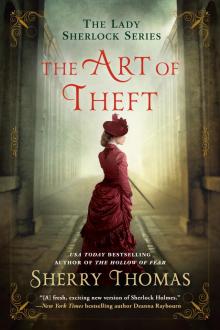 The Art of Theft
The Art of Theft The Magnolia Sword: A Ballad of Mulan
The Magnolia Sword: A Ballad of Mulan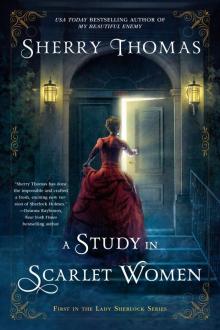 A Study In Scarlet Women
A Study In Scarlet Women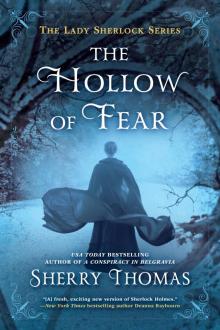 The Hollow of Fear
The Hollow of Fear The Magnolia Sword
The Magnolia Sword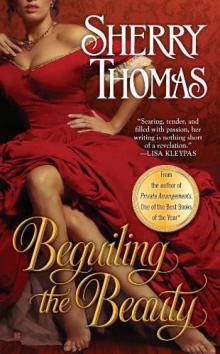 Beguiling the Beauty ft-1
Beguiling the Beauty ft-1 The Heart is a Universe
The Heart is a Universe The Hidden Blade: A Prequel to My Beautiful Enemy (Heart of Blade)
The Hidden Blade: A Prequel to My Beautiful Enemy (Heart of Blade)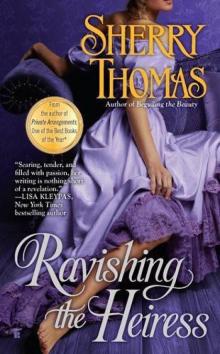 Ravishing the Heiress ft-2
Ravishing the Heiress ft-2 The Immortal Heights
The Immortal Heights The Hidden Blade
The Hidden Blade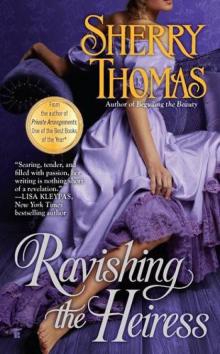 Ravishing the Heiress
Ravishing the Heiress Tempting the Bride
Tempting the Bride The Luckiest Lady in London
The Luckiest Lady in London The Bride of Larkspear: A Fitzhugh Trilogy Erotic Novella
The Bride of Larkspear: A Fitzhugh Trilogy Erotic Novella Claiming the Duchess
Claiming the Duchess The One in My Heart
The One in My Heart His At Night
His At Night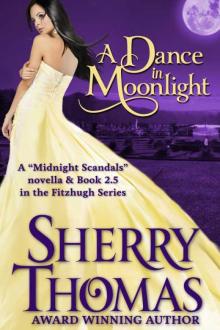 A Dance in Moonlight
A Dance in Moonlight A Conspiracy in Belgravia
A Conspiracy in Belgravia Not Quite a Husband
Not Quite a Husband